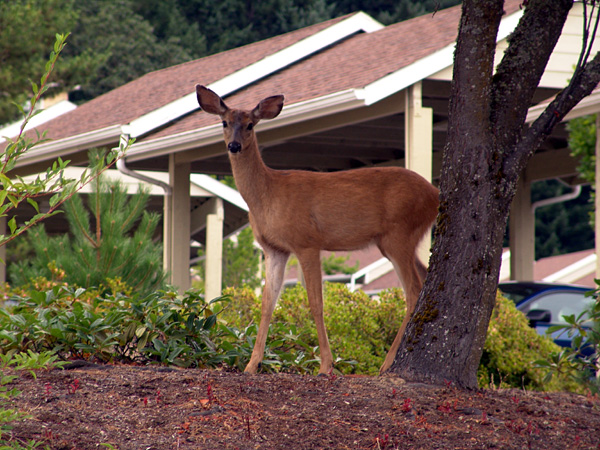
I know, this is probably a very strange question, but I have been pondering on this a while. Are we anthropomorphizing human beings?
Typically, those who really care about animals and claim that they are feeling, intelligent beings not so dissimilar from us, are being admonished not to anthropomorphize animals, not to treat them as similar to human beings.
Now, I have had the privilege of spending quite some time with different animals. Pets, of course, are easy – mine have been cats. Of course, you feel a special connection to your pet. Cats are magnificent in their elegance, somehow comical in their need to be taken care of by us – despite their grandiose and somewhat snobbish displays of their own superiority, and great teachers in patience and affection. If you haven’t seen a cat look at you with utter love and satisfaction, you haven’t lived. But I digress.
For quite some years now, I have been living in a neighborhood with white-tailed deer, grey squirrels, various birds (I have a list!), raccoons, etc. It’s a riot sometimes. This has taught me to see the world as a shared space, and my backyard is not really mine alone. After a while, you learn that deer are intelligent beings, that they quarrel with each other, that they can be affectionate, curious, skittish, etc. Once I noticed a baby deer crying for their mother, lost and afraid. It’s a heart-wrenching sound. The little one went away, and a few minutes another deer arrived that seemed like the mother. She looked at me, I gestured into the direction of the fawn, and she went there – following my gesture, it seemed. I could, of course be wrong. She could have picked up a trace, heard the call, whatever. But I cannot shake the feeling that she indeed understood. I have had several other similar encounters where I am sure that they understood me.
Is it too much to think that this could be possible?
Sometimes, a squirrel watches us eat through the window. They occasionally pick up scraps from the birdfeeder, and a baby squirrel has been raiding the feeder regularly. When they see us eat, they look at us, demandingly. They know what we are doing, and they want something too. The baby seemingly enjoys seeing us chase them off the feeder, coyly looking back at us, knowing full well that we cannot watch the feeder forever. Oh well.
The birds have a breakfast, lunch and dinner rush at the feeder. When it’s empty, they let me know, and when I have filled it, they announce it to the neighborhood. Nuthatches are fearless and curious, chickadees demanding, and Jays know they own the place.
Have I been at home too much during the pandemic? Maybe. But having spent more time with the animals out there, I cannot help but wonder why we should not recognize their faculties. We are all products of evolution, we all share vast amounts of DNA, we have all evolved to live in a much similar world (same planet, different but similar ecosystems). Why wouldn’t it be surprising to see similarities?
We assume all humans are somehow alike – but we don’t want to admit that we are animals, and that animals are somehow like us also. Many American Indian stories talk of animals as people. Indigenous peoples all over the world have been living in much closer community in nature for much longer than those of us who have been able to insulate ourselves more from nature. But we are missing out if we lose that connection.
If we are told not to anthropomorphize animals, this is probably done in order to allow us, mentally, to still be able to eat them. In understand. I am not a vegetarian. I would prefer not to eat my animal friends around me though. But even predator and prey can have a connection, and can develop an understanding of each other as equal when it comes to the dignity of life. You can still eat animals, but you should treat them with dignity and respect till the end – which is something human beings don’t seem to do any more. When a predator catches their prey, they typically kill it quickly, almost gently. No need to have someone suffer.
Now, I can go two different ways with this here. Either assume that we should not anthropomorphize humans, because they would not be able to live up to their own standards of deliberate and emotional intelligence. Or, I could assume that being human isn’t what it’s hyped up to be.
Who is massively contributing to a loss in biodiversity, and to climate change? It’s the human animal. Maybe here is a third alternative: Anthropomorphizing animals is an insult to them. They are so much smarter than us, it may seem after all…

